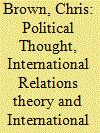| Srl | Item |
| 1 |
ID:
110642


|
|
|
|
|
| Publication |
2011.
|
| Summary/Abstract |
This article addresses the pedagogical value of teaching Aristotle's Politics 4.1 early in an introductory course in political theory that draws texts from the history of political thought. I argue that this chapter provides an interpretive key to understanding arguments made elsewhere in the Politics and can be used to introduce students to the kinds of theorizing that appear in the study of politics more generally. I begin by laying out some common learning obstacles that students experience in introductory political theory courses, using Politics 4.1 to address these issues. I then outline my approach to this text and conclude by reflecting on some of the possibilities and limitations of this method of introducing the nature of political theory to an undergraduate population.
|
|
|
|
|
|
|
|
|
|
|
|
|
|
|
|
| 2 |
ID:
155785


|
|
|
|
|
| Summary/Abstract |
The relationship between political theory, including the history of political thought, and International Relations theory, including the history of international thought, has been, and to some extent remains, complex and troubled. On both sides of the Atlantic, the mid-twentieth century founders of International Relations as an academic discipline drew extensively on the canon of political thought, but approached the subject in an uncritical way, while political philosophers largely disdained the international as a focus. This changed in the 1970s and 1980s, with the emergence of the ‘justice industry’ based on critiques of Rawls’ A Theory of Justice and a consequent recovering of the past history of cosmopolitan and communitarian thought. A new discourse emerged in this period – International Political Theory – bridging the gap between political thought and international relations and stimulating a far more creative and scholarly approach to the history of international thought. However, in a social science environment dominated by the methods of economics, that is, formal theory and quantification, the new discourse of International Political Theory occupies a niche rather than existing at the centre of the discipline.
|
|
|
|
|
|
|
|
|
|
|
|
|
|
|
|
| 3 |
ID:
110644


|
|
|
|
|
| Publication |
2011.
|
| Summary/Abstract |
This article examines a mock trial I have developed and used in teaching the history of political thought. Mock trials have been underused but have great potential to become an effective and exciting tool for student learning in this area. In this mock trial, the plaintiff, defendant, attorneys, and witnesses are eminent political or economic thinkers or political leaders of the past. Active engagement in this mock trial helped my students immensely in gaining deeper insight into and a more nuanced understanding of the ideas of the thinker they represented, as well as enhancing their critical and analytical abilities and improving their research skills. As a teaching tool that is amenable to creative adaptation, a mock trial can be an engaging and effective exercise for delving into the history of political thought and making it more relevant.
|
|
|
|
|
|
|
|
|
|
|
|
|
|
|
|